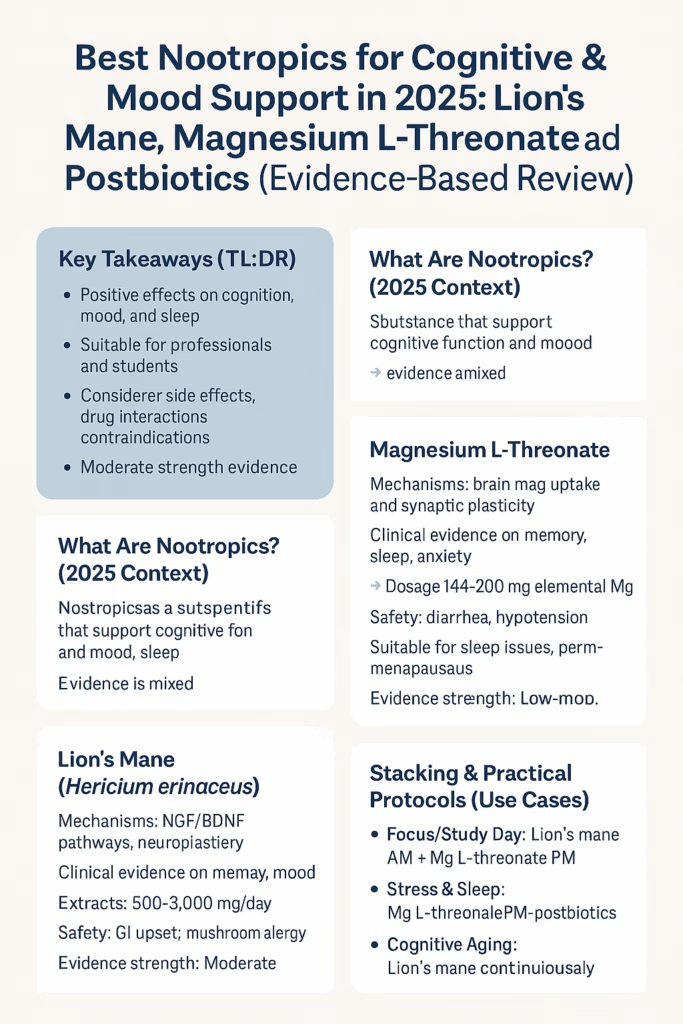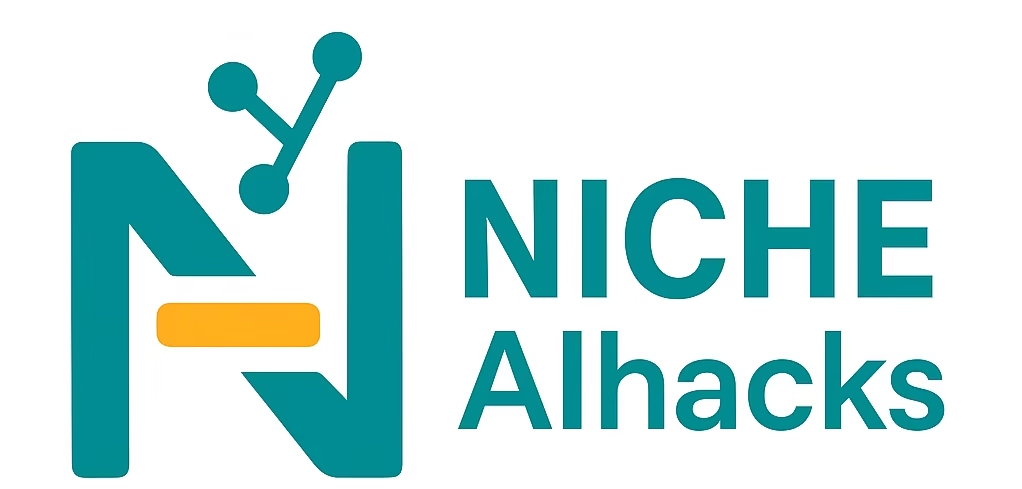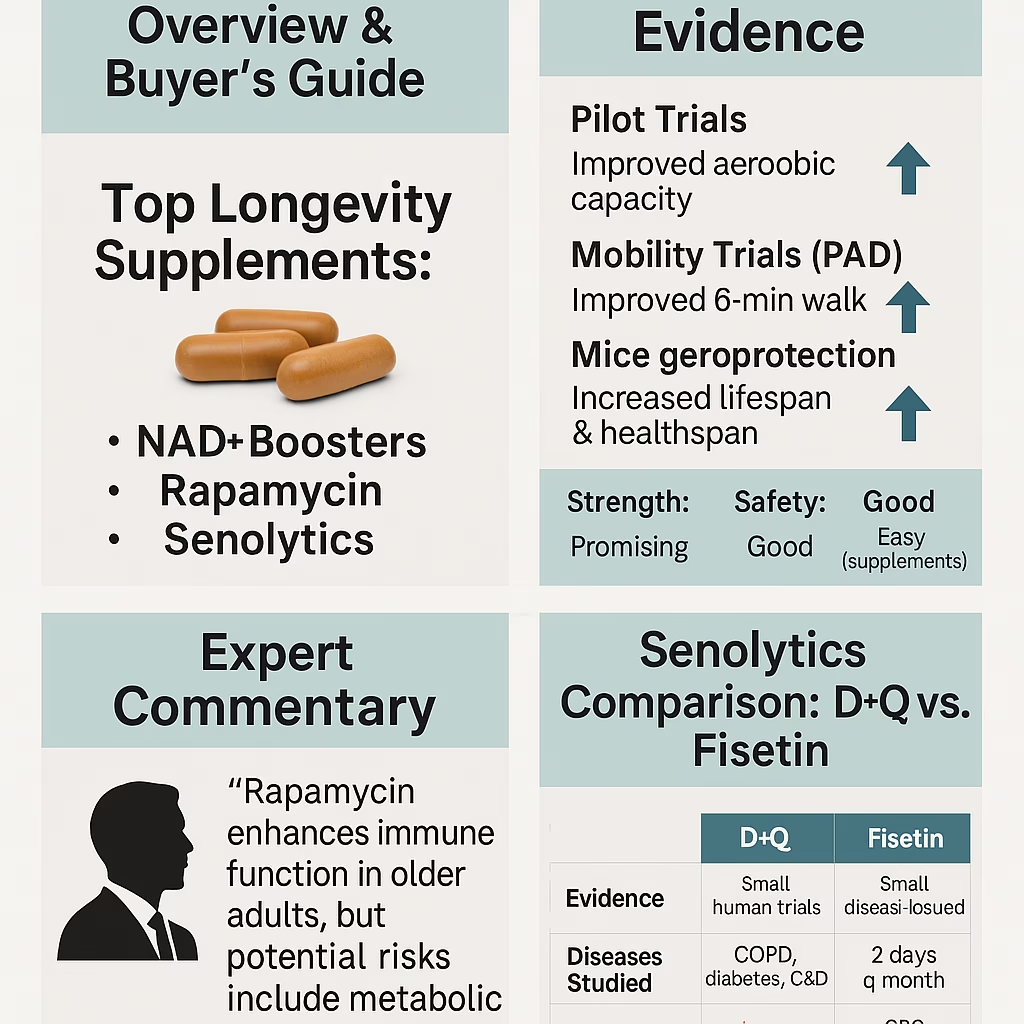Best Nootropics for Cognitive & Mood Support in 2025: Lion’s Mane, Magnesium L-Threonate, and Postbiotics (Evidence-Based Review)
Key Takeaways
- Lion’s Mane shows moderate evidence for improving mild cognitive impairment, with low–moderate evidence for mood and stress benefits. Best suited for older adults with early cognitive changes or high-stress professionals.
- Magnesium L-Threonate offers moderate evidence for enhancing sleep quality and next-day mood/alertness, with low–moderate support for objective cognitive gains.
- Postbiotics have low–moderate evidence—promising for stress resilience and mood support in specific strains—but the research is still early.
- All three are generally safe but caution is needed for mushroom allergy (Lion’s Mane), renal impairment (Magnesium), and immunocompromised status (postbiotics).
- A practical stack: Lion’s Mane in the morning, Magnesium L-Threonate in the evening, and a daily postbiotic—paired with good sleep, nutrition, and exercise—for comprehensive support.
What Are Nootropics? (2025 Context)
Nootropics are substances designed to enhance brain functions like memory, focus, and mood, ideally without significant adverse effects.
In 2025, the conversation has matured—distinguishing between:
- Symptomatic support (short-term improvements in focus, stress, or sleep quality)
- Disease-modifying potential (e.g., slowing the progression of mild cognitive impairment)
So far, the strongest evidence is for short- to medium-term symptomatic improvement, while disease-modifying claims remain under investigation.

How We Evaluated the Evidence
Our review prioritized randomized controlled trials, meta-analyses, and systematic reviews from reputable journals like JAMA, BMJ, Nature, and Frontiers in Nutrition.
We focused on outcomes such as:
- Cognitive performance measures (MoCA, Stroop test)
- Mood scales (Hamilton Depression Rating Scale, Hospital Anxiety and Depression Scale)
- Sleep quality indices (Pittsburgh Sleep Quality Index, wearable device data)
- Safety and tolerability in different populations
Evidence was rated as High, Moderate, or Low based on sample size, study quality, and reproducibility.
Lion’s Mane (Hericium erinaceus)
Mechanisms
Lion’s Mane contains bioactive compounds—hericenones and erinacines—that stimulate nerve growth factor (NGF) and brain-derived neurotrophic factor (BDNF), both critical for neuroplasticity.
Animal studies suggest it promotes hippocampal neurogenesis, reduces neuroinflammation, and supports gut microbiota diversity, potentially influencing the gut–brain axis.
Clinical Evidence
- In healthy young adults, a single 3-gram dose of fruiting body extract did not improve overall cognition or mood but did enhance fine motor coordination in a pegboard test.
- A 28-day regimen of 1.8 g/day improved Stroop test reaction times and showed a trend toward reduced subjective stress.
- In older adults with mild cognitive impairment, 16 weeks of daily supplementation (~3 g/day) led to significant cognitive score improvements compared to placebo, though gains faded after stopping the supplement.
- Postmenopausal women taking ~3.2 g/day for 12 weeks reported reduced depression and anxiety scores by roughly one-third.
Evidence Strength:
Moderate for cognition in mild cognitive impairment; low–moderate for mood/stress. The research is promising but limited by small studies and varying extract quality.
Dosage & Forms
- Range: 500 mg–3 g/day
- Preferred Form: Standardized fruiting body extract with disclosed erinacine/hericenone content
- Timing: Morning, with or without food
Safety
Mild gastrointestinal upset, nausea, or rash may occur. Avoid in mushroom allergies or autoimmune conditions. Safety in pregnancy and lactation is not established.
Magnesium L-Threonate
Mechanisms
Magnesium L-Threonate stands out for its ability to cross the blood–brain barrier and raise brain magnesium levels.
This supports synaptic plasticity, improves long-term potentiation (LTP), and helps balance NMDA and GABA neurotransmission—linked to better sleep and stress regulation.
Clinical Evidence
- A 21-day trial in adults with self-reported sleep issues found that 1 g/day improved deep and REM sleep by 7–10%, as well as next-day mood, alertness, and productivity, measured both subjectively and with wearable devices.
- In older adults, longer-term use (12 weeks) led to modest improvements in working memory.
- Comparative data suggest it may have more direct CNS effects than other magnesium salts like glycinate or citrate.
Evidence Strength:
Moderate for sleep quality and mood; low–moderate for cognitive performance.
Dosage & Forms
- Range: 1,000–2,000 mg/day (144–200 mg elemental magnesium)
- Split Dosing: Morning and evening, or all in the evening for sleep
- With food: Improves GI comfort
Safety
Generally well tolerated; may cause mild headache, drowsiness, or GI upset. Use caution in renal impairment. Separate from thyroid medication or certain antibiotics by 2–4 hours.
Think you’ve got this covered? Test yourself with my deep dive on “Ashwagandha Benefits Backed by Science: Stress Relief, Better Sleep & Mood Boost (2025 Guide)” — you might be surprised

Postbiotics
Mechanisms
Postbiotics are non-living microbial products—such as heat-killed bacteria or their metabolites—that can still confer health benefits.
These include short-chain fatty acids like butyrate, which reduce inflammation, modulate immune function, and influence neurotransmitter synthesis via the gut–brain axis.
Clinical Evidence
- Heat-killed Lactobacillus gasseri has been shown to reduce anxiety and depressive symptoms in stressed individuals.
- Lactobacillus plantarum derivatives have improved mood and reduced fatigue in athletes.
- In adults with insomnia and depression, heat-killed L. plantarum improved both sleep quality and mood.
- Meta-analyses combining probiotics, synbiotics, and postbiotics suggest moderate reductions in depressive symptoms and anxiety, though postbiotic-specific trials are still few.
Evidence Strength:
Low–moderate for mood/stress; low for cognition. Most benefits appear strain-specific.
Dosage & Forms
- Strain-specific, reported as CFU-equivalents or mg
- Typically in capsules or sachets, stable at room temperature
Safety
Generally safe; minor gastrointestinal changes possible. Use caution in severe immunocompromise.
| Attribute | Lion’s Mane | Magnesium L-Threonate | Postbiotics |
|---|---|---|---|
| Primary Mechanism | Stimulates NGF & BDNF → neuroplasticity; reduces neuroinflammation; supports gut–brain axis | Crosses blood–brain barrier; raises brain Mg²⁺; enhances synaptic plasticity; modulates NMDA/GABA balance | Modulates gut–brain axis; anti-inflammatory; supports serotonin synthesis |
| Main Clinical Outcomes | Improved cognition in MCI; possible mood & stress reduction | Better deep/REM sleep; improved mood/alertness; modest cognitive gains | Reduced anxiety, depression, fatigue in strain-specific studies; possible sleep improvement |
| Typical Dose Range | 500 mg–3 g/day (fruiting body extract) | 1,000–2,000 mg/day (~144–200 mg elemental Mg) | Strain-specific; CFU-equivalents or mg |
| Onset of Effects | 4–16 weeks | 3–21 days | 2–6 weeks |
| Evidence Strength | Moderate (cognition in MCI); Low–Moderate (mood/stress) | Moderate (sleep/mood); Low–Moderate (cognition) | Low–Moderate (mood/stress); Low (cognition) |
| Safety Notes | Mild GI upset, nausea, rash; avoid with mushroom allergy or autoimmunity | Generally well tolerated; caution in renal impairment; space from thyroid meds & antibiotics | Generally safe; minor GI effects; caution in severe immunocompromise |
Stacking & Practical Protocols
For Focus/Study Days
- AM: Lion’s Mane 500–1,000 mg
- PM: Magnesium L-Threonate 500–1,000 mg
- Combine with good hydration and timed caffeine
For Stress & Sleep
- PM: Magnesium L-Threonate 1,000 mg + targeted postbiotic
- Add a calming bedtime routine
For Cognitive Aging
- Daily Lion’s Mane for 8–12 weeks + Magnesium L-Threonate
- Pair with aerobic exercise and Mediterranean-style diet
Some of the most trusted nootropic supplements available on Amazon are shown below. These are evidence-backed and widely used
Swanson Premium Swanson Full Spectrum Lion’s Mane Mushroom
Now Foods, Magtein
Giver Nutrition Ultra Brain Nootropic Brain Supplement
Safety Summary Table
| Supplement | Main Cautions | Key Interactions |
|---|---|---|
| Lion’s Mane | Mushroom allergy, autoimmunity | Possible additive effects with antiplatelet or immunomodulator drugs |
| Magnesium L-Threonate | Renal impairment, hypotension | Space dosing from thyroid meds and certain antibiotics |
| Postbiotics | Severe immunocompromise | None significant |
Buyer’s Guide
- Look for third-party testing (NSF, USP, ISO 17025)
- Standardized extract details (for Lion’s Mane)
- Clear elemental magnesium labeling (for Mg L-Threonate)
- Strain-specific labeling for postbiotics
- Certificates of Analysis accessible by QR code or batch number
| Dosing Attribute | Lion’s Mane | Magnesium L-Threonate | Postbiotics |
|---|---|---|---|
| Daily Dose Range | 500 mg–3 g | 1,000–2,000 mg (~144–200 mg elemental Mg) | Strain-specific (check label) |
| Best Timing | Morning | Evening or split AM/PM | Any time |
| With/Without Food | Either | With food for GI comfort | With food if GI sensitive |
| Cycle Recommendation | Optional: 8–12 weeks on, 1–2 weeks off | Continuous use | Continuous use |
| Track Progress With | Memory tests (MoCA), stress scales, personal notes | Sleep tracker, mood journal, daily energy logs | Sleep quality logs, mood diary, GI comfort notes |
Conclusion
- Lion’s Mane: Best evidence for older adults with early cognitive decline [3]; emerging for mood/stress [2].
- Mg L-Threonate: Reliable for sleep quality and next-day mental performance [5]; modest cognitive effects [7].
- Postbiotics: Promising adjunct for mood/stress—strain choice matters [9][10].
All should be considered adjuncts to lifestyle measures, not replacements for medical treatment.
All three can be effective adjuncts to a healthy lifestyle but should not replace medical care.
If this part caught your eye, wait till you see how it connects with “Top Longevity Supplements 2025: Evidence, Expert Insights, and the Future of Anti-Aging Science” — check it out here.
Compliance & Safety Disclaimer
This article is for educational purposes only. It is not medical advice. Always consult a qualified healthcare professional before starting any supplement, especially if you are pregnant, breastfeeding, have a chronic condition, or take prescription medications.
References
Lion’s Mane (Hericium erinaceus)
- Surendran et al. (2025) – Acute RCT (3 g fruiting-body extract, healthy young adults) found no global cognitive/mood improvement, but pegboard test performance improved. ScienceDirectMDPI+3PubMed+3PMC+3
- Docherty et al. (2023) – RCT (1.8 g/day for 28 days): faster Stroop performance at 60 min; trend toward reduced subjective stress at 28 days (p = 0.051). MDPI+1
- Contato et al. (2025) – Double-blind, placebo-controlled study (16 weeks): significant cognitive improvements with H. erinaceus extract. PMC+8PMC+8PMC+8
- Cornford et al. (2025) – Narrative review: Erinacine-A–enriched H. erinaceus shows potential to delay Alzheimer’s progression; positive human and animal data. PubMed
Magnesium L-Threonate
- Hausenblas et al. (2024) – RCT: Mg L‑threonate improved deep/REM sleep, mood, energy, and alertness (Oura ring metrics). MDPI+15PubMed+15PubMed+15
- Hausenblas et al. Erratum (2025) – Confirms trial design and outcome validity; retrospective registration noted. PubMed
- Patel et al. (2024) – Preclinical review: Mg L‑threonate increases brain Mg²⁺, enhances synaptic density, and reverses aspects of brain aging. Frontiers
- EP on Nutrition (2024) – Safety data: No accumulation at repeated high doses (2,025 mg twice daily); only minor diarrhea reported. PMC
Postbiotics / Gut–Brain Axis
- Dai et al. (2025) – Meta-analysis (PPSP in depression): Moderate benefit in reducing depressive symptoms (SMD –0.39), with probiotics and synbiotics showing strongest effects. PubMed+3PubMed+3WJGNet+3
- Asad et al. (2025) – Meta-analysis: Probiotics significantly reduced depression (SMD –0.96) and anxiety (SMD –0.59) in 23 RCTs. PubMed
- Johnson et al. (2025) – Review: Meta-analyses show probiotics benefit emotion regulation, especially in clinical populations; effects in healthy individuals less clear. Nature
- Menni (2025) – Review of psychobiotics: Most RCTs (2014–2025) showed significant improvement in depressive symptoms, especially in adjunctive settings. PubMed





Your blog has quickly become my go-to source for reliable information and thought-provoking commentary. I’m constantly recommending it to friends and colleagues. Keep up the excellent work!
Thank you so much, your appreciation means a lot to me and my team.
Thank you so much, your appreciation means a lot to me and my team. let me know what else can i work on…any new topics.
Your blog is a treasure trove of knowledge! I’m constantly amazed by the depth of your insights and the clarity of your writing. Keep up the phenomenal work!
Thank you so much, your appreciation means a lot to me and my team.
Your blog is a treasure trove of valuable insights and thought-provoking commentary. Your dedication to your craft is evident in every word you write. Keep up the fantastic work!
Thank you so much, your appreciation means a lot to me and my team.
Thank you so much, your appreciation means a lot to me and my team
Your blog is a testament to your dedication to your craft. Your commitment to excellence is evident in every aspect of your writing. Thank you for being such a positive influence in the online community.
Thank you so much, your appreciation means a lot to me and my team.
thanks a lot.
Your blog is a true hidden gem on the internet. Your thoughtful analysis and engaging writing style set you apart from the crowd. Keep up the excellent work!
thank you
I just could not leave your web site before suggesting that I really enjoyed the standard information a person supply to your visitors Is gonna be again steadily in order to check up on new posts